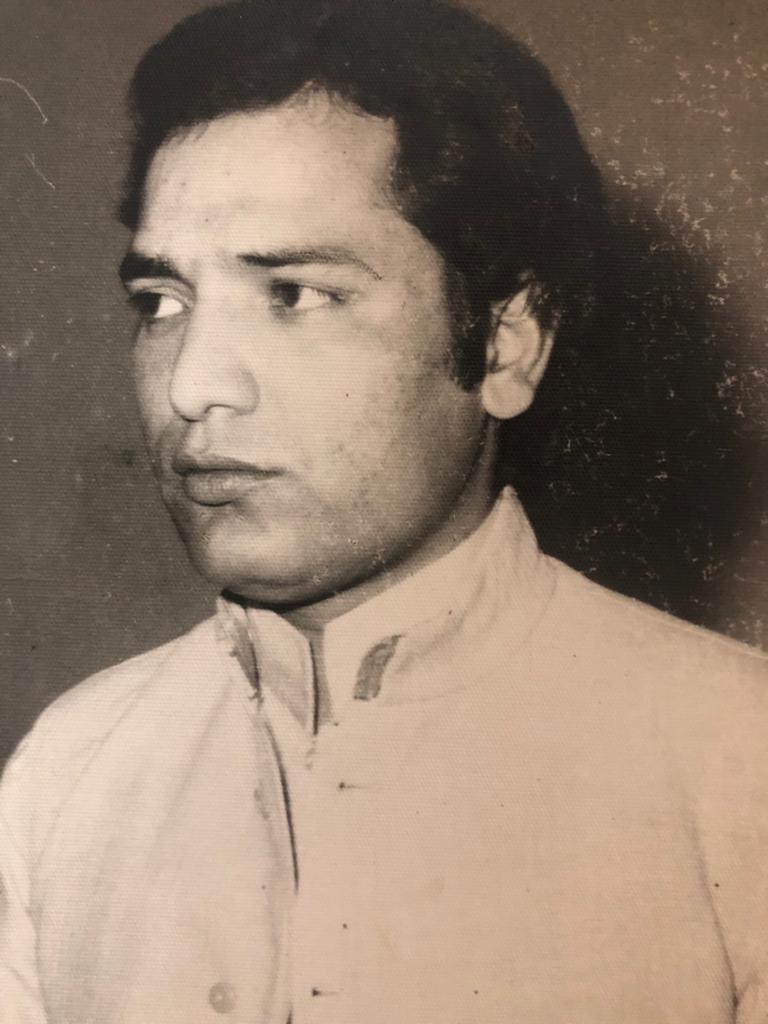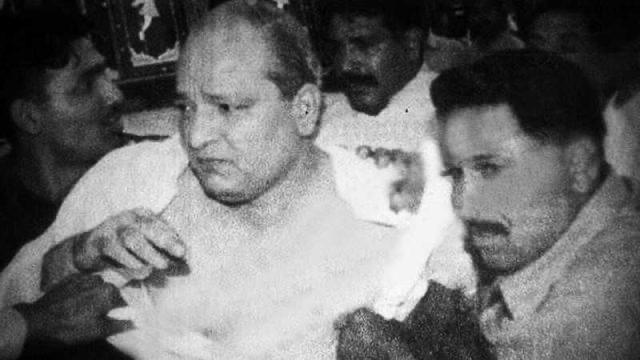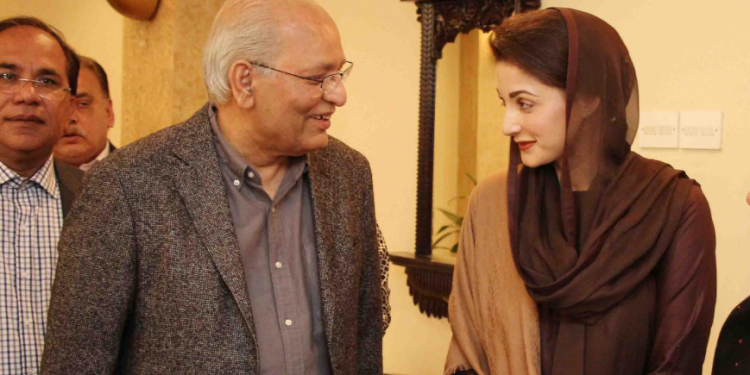When PML-N stalwart Senator Mushahid Ullah Khan passed away in Islamabad at the age of 68 in February 2021, his fellow senators from both the opposition and treasury benches lauded his significant contributions to democracy. He was known for his impassioned speeches, often adorned with fitting verses. However, to me, he was my beloved Abbu Jaan.

When Pakistan was created in 1947, my grandfather, a Yousafzai Pashtun, migrated from the Indian state of Uttar Pradesh to the newly established country and settled in Rawalpindi. My father, Mushahid Ullah Khan, was born in 1953. He had four brothers and two sisters. He received his early education at Islamia High School and completed his graduation at Gordon College in Rawalpindi. My grandfather worked in Military Accounts. Our family was devoutly religious and adhered to conservative Islamic practices.

Mushahid Ullah Khan was introduced to politics at a young age, as both his parents were members of Jamaat-e-Islami (JI). Their home located at College Road on Street 4 in Rawalpindi, served as a centre of political activities. His mother later assumed the role of nazima in JI Rawalpindi. He started participating in student politics under the banner of JI’s student wing called Islami Jamiat Talaba, where he received his initial political training.
He was actively engaged in student politics and won several elections of Jamiat. Due to his political activism, he garnered attention from local leaders. In 1968, when Zulfikar Ali Bhutto was organising the Pakistan People’s Party (PPP), Mushahid Ullah Khan at the young age of 15, had the opportunity to meet him as part of a delegation led by Chaudhry Zahoor Elahi. It was during this time that he started handling public relations and media responsibilities for Chaudhry Zahoor Elahi. He staunchly believed that General Ayub Khan’s dictatorship had significantly harmed democracy and the country, and its consequences became evident after the secession of East Pakistan. He remained engaged in politics in various capacities and was groomed in grassroots politics.
In 1972, UN Secretary-General (UNSG) Kurt Josef Waldheim visited Pakistan. When he emerged from the old Rawalpindi airport, Mushahid Ullah Khan and his friend Afzal Mirza jumped in front of his car. These youngsters handed over a memorandum to the UNSG, demanding the release of Pakistani prisoners of war held by India, until the UNSG’s security arrived.

MUSHARRAF’S COUP IN KARACHI IN OCTOBER 1999
Mushahid Ullah Khan was the only PML-N leader who demonstrated the courage to openly challenge a military dictator following the 1999 military coup. On 14 October 1999, he managed to sneak out to Regal Chowk and chanted the slogan, “Death to Dictatorship.” As soon as the police guarding the chowk heard his cry, they pounced on him and subjected him to brutal beatings. His picture in police custody, wearing a tattered shirt, became an icon of resistance.
In 1973-74, Mushahid Ullah Khan started working in Pakistan International Airlines (PIA) Ground Handling Services and soon became active in the workers’ union at PIA. When the Soviet Union invaded Afghanistan in 1979, Mushahid Ullah Khan, through his political activism, found himself at the forefront of what was perceived as the Soviets’ war against Islam.

In 1982, he relocated with his family from Rawalpindi to Karachi because PIA had a larger presence at Pakistan’s largest airport in Karachi, and a majority of ground services staff was based there. Leveraging his political experience, Mushahid Ullah Khan organised workers under the banner of PIASI. Unfortunately, he soon lost his job due to his activism against General Zia-ul-Haq’s dictatorial rule in the country. However, he seized this opportunity to pursue further education and obtained a law degree from the University of Karachi.
In 1986-87, although the Pakistan Muslim League-Nawaz had not yet been formally launched, Mian Nawaz Sharif was already a rising political star. When Mushahid Ullah Khan met Mian sahib, who was then serving as Punjab’s chief minister, he believed that he was the man who could shape Pakistan’s future. From that point forward, he remained loyal to Mian sahib for the rest of his life.
Mushahid Ullah Khan was reinstated to his position in PIA after Zia-ul-Haq’s military rule ended in 1988. He continued his efforts to organise PIA workers and eventually became the president of PIASI-Mushahid Ullah. In 1993, when Pakistan Muslim League-Nawaz was established, Mushahid Ullah Khan renamed PIASI as Air League to signify its affiliation with PML-N. It went on to become the main workers’ union of PIA.

When PML-N came to power in 1997, Mushahid Ullah Khan was among the first members to be appointed to the cabinet by then Prime Minister Mian Nawaz Sharif, who inducted him as an advisor with a rank of grade 22 officer. Consequently, he moved back from Karachi to Islamabad. In 1999, Mian sahib appointed him as the mayor of Karachi. However, this tenure was cut short as General Pervez Musharraf toppled the government in October of that year through a military coup.

Mushahid Ullah Khan was the only PML-N leader who demonstrated the courage to openly challenge a military dictator. Following the 1999 coup, some PML-N leaders switched sides, while others went into hiding to avoid arrest. However, Mushahid Ullah Khan evaded arrest for two days and then held a press conference against General Musharraf’s coup at Karachi Press Club on 14 October 1999. After the press conference, he managed to sneak out to Regal Chowk without getting arrested and chanted the slogan, “Death to Dictatorship.” As soon as the police guarding the chowk heard his cry, they pounced on him and subjected him to brutal beatings. His picture in police custody, wearing a tattered shirt, became an icon of resistance.
Throughout his political career, Mushahid Ullah Khan held significant positions within the PML-N party and the government. In 2009, he was elected as a senator for six years, during which he served on several standing committees. He was again elected to the Senate of Pakistan in 2015 and was appointed as the federal minister for environment and climate change in Prime Minister Mian Nawaz Sharif’s cabinet in January 2015, remaining in this position until August of that year. He was appointed as the federal minister for climate change in August 2017 in Prime Minister Shahid Khaqan Abbasi’s cabinet and served until the term of the government ended.

Abbu Jaan was passionate about cricket and even played first-class cricket for Rawalpindi in his youth. He loved to travel and explore and had visited about 50-60 countries. However, what truly stood out was his avid reading habit.
Abbu Jaan greatly enjoyed the food and took great delight in desi dishes, such as nihari, paye, tikka, daal and sabzi. He preferred pure organic foods over other types of food. One of his favourite hobbies was fishing, and he would often take me and my brother to Rawal Dam, Tarbela Dam, and Simli Dam for fishing trips. Eel, which has a snake-like body and is called “baam” in Urdu, was Abbu Jaan’s favourite. Catching this fish was a challenge as it wouldn’t get caught in the net; instead, one had t rely on fishing hooks or catch it by hand.

Abbu Jaan was passionate about cricket and even played first-class cricket for Rawalpindi in his youth. He loved to travel and explore and had visited about 50-60 countries. However, what truly stood out was his avid reading habit. He read all the newspapers of the day, including columns, to stay informed about current events. Moreover, he regularly read books. He passed on his love for reading to me as well.
Abbu Jaan was carefree by nature and didn’t worry much about money. Unlike many of his colleagues, he hailed from a middle-class family and rose to the highest echelons of political power through sheer hard work and grassroots politics.
The writer is a member of the Senate.









